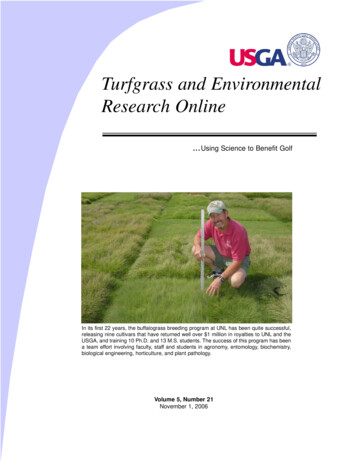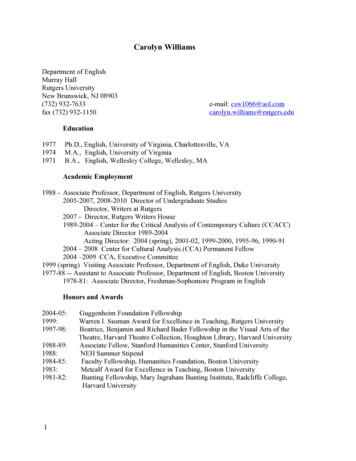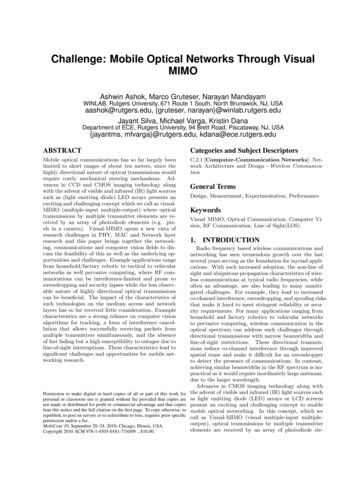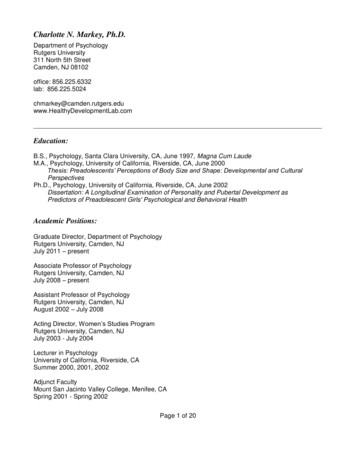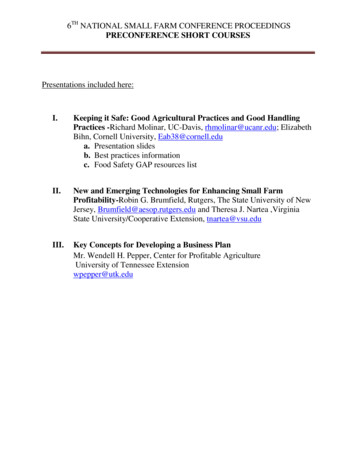
Transcription
2002RUTGERSTurfgrass ProceedingsRutgersUniversityTHE NEW JERSEY TURFGRASS ASSOCIATIONIn Cooperation WithRUTGERS COOPERATIVE EXTENSIONNEW JERSEY AGRICULTURAL EXPERIMENT STATIONRUTGERS, THE STATE UNIVERSITY OF NEW JERSEYNEW BRUNSWICKDistributed in cooperation with U. S. Department of Agriculture in furtherance of the Acts of Congress on May 8 and June 30, 1914. Rutgers Cooperative Extension works inagriculture, family and consumer sciences, and 4-H. Adesoji O. Adelaja, Director of Extension, Rutgers Cooperative Extension provides information and educational servicesto all people without regard to race, color, national origin, gender, religion, age, disability, political beliefs, sexual orientation, or marital or family status. (Not all prohibitedbases apply to all programs.) Rutgers Cooperative Extension is an Equal Opportunity Program Provider and Employer.
2002 RUTGERS TURFGRASS PROCEEDINGSof theNew Jersey Turfgrass ExpoDecember 10-12, 2002Trump Taj MahalAtlantic City, New JerseyThe Rutgers Turfgrass Proceedings is publishedyearly by the Rutgers Center for Turfgrass Science,Rutgers Cooperative Extension, and the New JerseyAgricultural Experiment Station, Cook College,Rutgers, The State University of New Jersey in cooperation with the New Jersey Turfgrass Association.The purpose of this document is to provide a forumfor the dissemination of information and the exchangeof ideas and knowledge. The proceedings provideturfgrass managers, research scientists, extensionspecialists, and industry personnel with opportunitiesto communicate with co-workers. Through this forum, these professionals also reach a more generalaudience, which includes the public.This publication includes lecture notes of paperspresented at the 2002 New Jersey Turfgrass Expo.Publication of these lectures provides a readily available source of information covering a wide range oftopics and includes technical and popular presentations of importance to the turfgrass industry.2002 Rutgers Turfgrass ProceedingsThis proceedings also includes research papersthat contain original research findings and reviews ofselected subjects in turfgrass science. These papersare presented primarily to facilitate the timely dissemination of original turfgrass research for use by theturfgrass industry.Special thanks are given to those who have submitted papers for this proceedings, to the New Jersey Turfgrass Association for financial assistance, andto those individuals who have provided support to theRutgers Turfgrass Research Program at Cook College, Rutgers, The State University of New Jersey.Dr. Ann Brooks Gould, EditorDr. Bruce B. Clarke, CoordinatorVolume 34
WHAT TO DO WHEN YOU’VE BEEN FIRED!Peter L. McCormick1You have heard the saying, “There are superintendents who have lost grass — and those who will.”Given the direction our industry has taken in recentyears, a 2002 version of that maxim might read,“There are superintendents who have been fired —and those who will.” With the accelerating demandsfor perfection on the golf course, and the lengths theindustry will go to achieve them, both adages will likelybe truer in the 21st Century than in the last.Ironically, in many situations, a golf course superintendent getting fired has little or nothing to dowith losing grass, although it rarely happens withoutsome underlying reason. There is no doubt we havecreated a monster of spiraling expectation, wheresuperintendents lose their jobs and families get uprooted over thousandths of an inch in height of cut,inches of ball roll, or minor imperfections of color.Playing conditions peaked for tournaments only several years ago are now demanded on a daily basis.We are testing the limits of Mother Nature, a conceptof which many golfers have no understanding, andShe usually wins.Who am I to address this subject? I have neverbeen a superintendent. I am not a PhD psychologistor career counselor, hardly a financial advisor, andcertainly not a priest. I am, however, a two-time survivor of the experience who took advantage of bothevents to redirect my life toward something better. Inthe years since, I have spent many, many momentsof reflection and retrospection on those defining moments and the situations leading up to them. Andfrom the chair in which I have been sitting for the past9 years as commander-in-chief and maestro ofTurfNet, I have seen way too many good superintendents, good people and good friends of mine, losetheir jobs, many times through no fault of their own,or at least, no blatant miscue, screw-up or failing.It’s refreshing and healthy to see this topic, longdiscussed only in whispered, closed door, backroomconversations, brought out of the closet and onto thetable. Job loss is receiving more and more attentionfrom the mainstream trade press, and has even beenacknowledged by GCSAA. But rather than the usualcursory overview with a case study or two and a suggestion to contact GCSAA’s career developmentpeople, we’re going to get into it right here. We willtake a look at the “job killers,” the warning signs, theemotional trauma, financial considerations, and thenpicking up the pieces and moving on.This is not intended as a lesson in the mechanics of finding a new job. It’s meant to be a practicalguide to avoiding the situation in the first place, andonce it happens, getting through the process with yoursoul intact.The scope of the problem.For a historical perspective, where did the phrase“being fired” come from, anyway? According to PaulHawken (founder of the Smith & Hawken garden storechain) in his book “Growing Your Business,” when agroup or village back in medieval times wanted toostracize a member, the townspeople went to theoffender’s home and burned it to the ground, alongwith all and everything inside. Relations were severed by firing. Thankfully we are not quite so barbaric any more.Even though this situation has become alarminglyvisible in recent years due to the speed and reach ofthe Internet, the actual numbers are fairly small. Forlack of any real statistics, let’s use 5% as a roundfigure. That means in a room of 100 golf course superintendents, five will lose their jobs this year. Theactual number may be slightly more or less, but 5% isTurfNet, Skillman, NJ.12002 Rutgers Turfgrass ProceedingsVolume 34
reasonably close (7% was the figure GCSAA citedrecently in Superintendent News).Admittedly, that’s not exactly cause for panic. Butit also means that, at least statistically, everyone willhave their turn once every 20 years. If you’re one ofthe few who survive an entire career as a superintendent, statistically speaking you’ll be fired twice duringyour career. Of course, some superintendents mayget fired twice or three times every 20 years and others won’t at all. But it never hurts to be aware, be onguard, be prepared, and have Plan B in mind at alltimes.This trend is certainly not unique to the golf courseindustry, for we are just a microcosm of society atlarge. Due in part to email, FedEx, next-day-this orsecond-day-that, our society today demands instantand immediate gratification. We want it now, with noexcuses. “Don’t tell me about the labor pains, showme the baby!” Our golfing clientele is no exception.It’s all about “What have you done for me lately?”Compounding the fragility of job tenure is the rateof change in our society, which has accelerated towarp speed. Companies are acquired and othersmerge or go out of business. Here today, gone tomorrow. Technology improves, obsolescence follows.Demographics shift. Stuff happens.As a result, career positions are becoming a dying breed, across all industries. Just ask any pro football coach, ex-Enron employee, or any of the 25- or30-year veteran superintendents who have been terminated within the last year. Age and experience havebecome liabilities. Youth, energy, and a lower pricetag are attractive. And there is another new crop ofyoung graduates every year who would love to haveyour job for half your going rate.My father-in-law got up and went to work in thesame factory building every day for 45 years beforeretiring about 15 years ago. Today, the company heworked for no longer exists. Unlike our parents’ generation, which could often count on a career-long tenure with one company, some say it is foolish for ustoday to plan past the next five years in any job, inany industry. Others say you can’t realistically lookbeyond the next two or three years.One of our TurfNet members (and a good friendof mine) received his walking papers recently after25 years at his club. Some gold watch. Located inthe greater NYC area, the club had turned over about2002 Rutgers Turfgrass Proceedingsone-third of the membership due to the economicslump after 9/11. All of a sudden, when greeting golfers around the first tee, he realized that he no longerknew many of them. Obviously, the new membershad no emotional attachment to him, either. Thingsbeyond our control can and do change, often veryquickly.Adding fuel to the fire is the escalation of salariesamong superintendents in recent years, particularlyin the major metropolitan areas. While that is undeniably a positive trend, unfortunately, as the stakesget higher, the fuse of owners, green committees, andothers in the club hierarchy tends to get shorter, requires less to light it.The Job KillersI did a casual survey on TurfNet.com to compilea list of “job killers” that have been known to hastenthe superintendent’s exit out the door. Let’s take alook at a few. Poor communication is a death knell. Goodcommunication is regular and ongoing: upwardto club management, downward to your staff, andoutward to your members or golfing public. Avoidsurprises. Keep the right people informed (particularly when problems arise) as to reasons, cost,and timelines for recovery. Without it, they haveno idea of the methodology behind your madness,especially as it affects playability, appearance, orbudget. “The Next Level.” Whatever that is, a lot ofclubs want it and are eager to replace their superintendent in search of it. The crossfire of club politics. We’ve all heardthe saying that being a golf course superintendent is “90% politics and 10% agronomy.” Communication, public relations and many other factors (including “don’t burn bridges” and “don’t tickoff that turkey who may someday become clubpresident”) are intertwined here. On the otherhand, it’s easy to blame club politics when othershortcomings are really at the root of the matter. “My” golf course. Folks, if you don’t own it, itisn’t yours. Period. There is usually a higherpower to answer to, and nine times out of ten,they have the last laugh.Volume 34
General managers run amok. You’ve all seenit. Ego, power plays, politics, and wanting to makea name for themselves all play into it, often atyour expense. Blinders and tunnel vision. Not seeing the forest for the trees. Focusing on the triple-cut whilethe water coolers remain empty, or planting killerannuals around the tee box while ignoring the broken ball washer nearby. Many a new hire hascome into a golf course, taken care of the simple,little things and looked like a hero, while the exsuperintendent who neglected them walks downthe road, hanging his head like a dog. Complacency and boredom. Boredom arisesfrom routine. Keep motivated by setting newgoals, integrating new technologies, tackling newprojects. Hire a stable of young people to learnfrom and keep you on your toes. Change or improve something in the maintenance facility every year to avoid stagnation, even if it’s just a coatof paint. Be aware of the 7-Year Itch.Invisibility. Don’t hide in your office or eat lunchin your truck. When in the office, use the computer as a tool rather than as entertainment. Workthe first tee like a politician on the stump, particularly on weekend mornings. Don’t fall into thetrap of disappearing when stressed or when thingsaren’t going right. It’s easy to do. In-season special projects. To call maximumattention to yourself, it’s hard to beat a flagrantmistake. Limit your focus during peak season toroutine maintenance. Do what you’re paid to do:produce great golfing conditions. This greatlyreduces the opportunity for highly visible, costlymistakes or disruptions, while you give full attention to getting your turf through the season intact. Employee mismanagement or abuse. Many asuperintendent has been shown the door with aknife in his back, often wielded by a disgruntledemployee. Mixed-gender crews open up furtheropportunities for abuse. Be careful, and be aware. Mismanagement of resources, including borrowing or lending club property, or worse.Those side landscape or seed jobs have alsobrought more than one superintendent down.2002 Rutgers Turfgrass Proceedings Alcohol and drug abuse. As upstanding as welike to think our industry is, we are not Superman. Golf course superintendents have pressures and work long hours like many others do.Some handle it better than others. Bad attitude. A catch-all, perhaps, but manygreat grass growers with a stubborn, “my way isthe only way” attitude have found themselves onthe outside looking in, while less talented superintendents with a cooperative, go-get-’em attitudecontinue to survive the cut. Conflicts with other departments. This canoften be combined with the “own agenda” and“bad attitude” job killers. Avoiding this situationin many cases boils down to choosing whichbattles you need to fight, and when you can giveground to accommodate others. Consider thefull scope of the potential consequences whendeciding whether or not to dig in your heels. Running for GCSAA President. Enough said.Of course, there are agronomic job killers as well,including repeated turf loss, bad chemical applications, poor housekeeping, and the “greener grassdown the street” syndrome.The warning signs.Warning signs are everywhere, but often cometo light only with the benefit of hindsight. When thecommunication stops — on anyone’s part, in eitherdirection — beware. That’s usually a foreshadowingof an unpleasant event. If meetings are held withoutyou, chances are your input isn’t valued very much orthey are planning your exit strategy for you. Whendecisions are made without your input, particularly asthey affect your areas of direct responsibility, startpacking your stuff. If the time for scheduled pay raisesor bonuses comes and goes with no explanation, update your resume. If they bring in a consultant (otherthan a scheduled USGA visit), more often than notyou’re out of luck.On your part, if you find yourself not wanting toget out of bed in the morning, or getting to work lateor leaving early, those are pretty good indicators thatyou have lost the fire in the belly. If you find yourselfmaking decisions on your own and circumventingproper channels of authority, you might soon discoverthose meetings being held without you.Volume 34
When I look back at my own situations, virtuallyall of the above warning signs were there. But a greatdeal of retrospection has led me to one conclusion: itwas me, more than anything else. In both instancesI was ready for a change, ready to move on, ready forthe next challenge — and that affected relationshipsenough to get me fired, both times. The fire in mybelly had gone out and I knew it, but didn’t act on it.You can’t predict. You can only prepare.The best defense is a good offense. Proactivelymanaging your career is the best way to avoid sudden job loss. That involves periodically assessingboth your enthusiasm for your job and your standingamong those around you. Know when you need tomake a change in advance of others making it foryou. Many superintendents have stayed one stepahead of the sheriff throughout their careers simplyby keeping their ears to the ground and taking theirinternal temperature on a regular basis.There’s another saying: “The best time to find anew job is when you don’t need one.” You can makeyour own choices, on your own terms. All it takes isthe savvy to realize the need and the guts to pull theplug and move on.In today’s climate, establishing a safety net or finetuning a Plan B should be constant and ongoing. Golfcourse superintendents have a wide range of skills,from permitting and environmental compliance toplumbing, electrical, mechanical, surveying, and earthmoving. Hone your skills to the point of making themmarketable. Become an expert in something, as apotential alternate career path at some point in thefuture.I bought my first personal computer back in 1992,at age 38, and taught myself how to use it. Why?Because I sensed the water swirling in the bowl, andknew that if I had to go back into the job market without PC skills, I didn’t stand a chance. Eighteen monthslater, there I was. And I had developed my computerskills enough by that point to start a new business.One thing does prepare you for the next.Perhaps the most critical proactive element incareer security is establishing a network. Involveyourself and stay active in the industry. Meet as manypeople as you can, across all disciplines, includinggolf course architects, irrigation designers, and builders. Stay on good terms with everyone, including clubmembers. These are key to establishing and main2002 Rutgers Turfgrass Proceedingstaining your network, which has rescued many anunemployed superintendent from the bread line.Prepare yourself financiallyThe emotional trauma of losing your job is badenough without having to worry about how you’regoing to feed your family. As with skill developmentand network building, this must be started early andcontinued on an ongoing basis. At particular risk arethose who live in club housing and/or drive club vehicles. You think it’s bad to lose your job? How aboutlosing your home and transportation as well? If youhave housing provided as part of your compensationpackage, find a way to buy a vacation home or rentalproperty to build equity and as a hedge against becoming homeless. Homeless? You bet. How’s thatfor a reality check?One of our TurfNet members told me one day, “IfI were to lose my job, all we would have is a U-Haulbehind my wife’s minivan.” That’s a pretty soberingthought. So he took it upon himself to build a vacation home for his family’s use during the summer andto build financial security over the years. The majority of the net worth of most people today has likelycome from appreciation of real estate more than anything else. Don’t be left out.Beyond owning a home, it’s critical to put somemoney aside, although this can be very difficult to do.The more we make, the more we tend to spend.Money in the bank is the best cushion for a soft landing should you lose your job. Three months’ takehome pay in the bank is a good goal, but six would bebetter. If you are living paycheck to paycheck withnothing saved, re-assess your lifestyle and makesome changes.Another TurfNet member, a very conservativeperson to start with, mentioned to me that he’s notafraid of losing his job. Why? “Because I spend a lotless than I make, and there’s plenty there to tide meover. I would just get another job or find somethingelse to do.” How many of us can say that?When planning for the future, keep in mind that,just like professional athletes, it’s very likely you won’twind up your career in this industry at peak income.OK, so you get the news. What now?Right out of the gate, get your financial house inorder. Negotiate proper severance — something youVolume 34
and your employer will likely disagree on, but a weekor two per year of service is pretty standard. Obviously, this is best done in advance.If you don’t get another job by the time your severance runs out, swallow your pride and apply forunemployment benefits (another reality check). Remember the bar scene from the original Star Wars,with all those mutants and cretins hanging around?That’s what the unemployment line is like. Believeme, it’s a humbling experience.Hunker down and put the brakes on all discretionary spending. It’s amazing how much money youcan NOT spend when you put your mind to it. Talk toyour creditors if need be. Somehow you’ll get throughit.Regardless of how it happens, losing your job canbe emotionally devastating, to both you and your family. Why? Because our society defines us as individuals more by what we do in life than by who weare. When someone meets us for the first time, oneof the first identifiers they seek out is what we do for aliving, not that we like to play the guitar or cook orcoach a soccer team. When we lose our job, we losea core component of our persona. We are viewed bymany, often including ourselves, as no longer whole.What should you expect when you suddenly findyourself unemployed? Expect your relationships tochange, or at least your casual ones. Your real friendswill stand by and support you, but your fair weatherfriends will likely duck you like the plague. I call thisthe “Leprosy Syndrome.” People feel an awkwardness talking to you or even being around you. Theydon’t know what to say, so they just avoid you. Myown brother-in-law didn’t speak to me for 3 monthsafter my last “event” because he didn’t know what tosay.There is a lesson there for all of us. I have beenguilty in the past of avoiding acquaintances who wereout of work, or who might have gotten a bad diagnosis, due to that same awkwardness. Don’t fall intothat trap when it happens to a friend or neighbor orthe superintendent down the street. Call him or sendhim an email to see how he’s doing. Stop by, stickout your hand, and offer a smile and a friendly word.“How are you doing?” is all that’s necessary.Taking that a step further, while walking the aislesat the trade shows, don’t look the other way when2002 Rutgers Turfgrass Proceedingsyou see a “jobless” guy approaching. Be certain hefeels weirder than you do, just being there. Say hey,look him in the eye, offer a word of encouragement,and ask how the search is going. Show that you care.He will appreciate that, and remember.If you should lose your job, be prepared to become the scapegoat among your former co-workers.You will be blamed for all that ails the golf course.Don’t let it bother you. It’s an unfortunate part of human nature.While you’re looking for your next job, be awareof the symptoms of clinical depression, a treatablephysical illness sometimes triggered by an event likejob loss. Running at full tilt for years and then hittingthe wall can screw up your internal chemistry. Symptoms of depression can include feelings of sadness,guilt, or hopelessness; irritability; fatigue or restlessness; loss of interest in favorite activities; irregularsleeping habits; or changes in weight or appetite. Ifyou find yourself experiencing more than several ofthese symptoms, swallow your pride and see yourdoctor. It’s not a sign of weakness.Your job loss can be even more difficult for yourfamily than yourself because they might not understand all that led up to it like you do. All they know isthat now you’re at home, and the paychecks will soonstop. I had barely walked in the door after receivingthe news the last time when one of my daughters,who was 8 years old at the time, asked me, “Daddy,are we going to be poor now?” That was almost rockbottom for me, but I’ll get back to that in a moment.Looking at the brighter side, this situation can bea good opportunity for you to be a role model for yourkids, depending upon their ages. One of my greatestsatisfactions was to involve my family in the startingof a new business and have them watch me rise abovethe fear and the doubt to grow a successful businessfrom little more than an idea.Get comfortable with it.The sooner you get comfortable with your newstatus, the faster you will be able to move on. Justlike the first step in dealing with alcoholism, we haveto accept it, come to grips with it, and embrace it before we can move on with the rest of our lives. Weneed to say it out loud. “I GOT FIRED!” Then say itagain. You are not the first, and you are not alone.There is no reason for shame. Hold your head high.Volume 34
And don’t hide behind the false cloak of “resignation,”“early retirement,” or “pursuing other interests.” That’sbologna, and everyone knows it.Talk about it. Talk to anyone who will listen, untilyou get it out of your system. Or write about it in ajournal, if only for your own eyes. Both are therapeutic. That’s another critical step in moving forward.Writing this is therapeutic for me, almost 10 yearslater.Give yourself quiet time to think. That’s a luxuryour lifestyles don’t allow us enough of. Turn off theTV, the car radio, your cell phone. I do my best thinking while asleep, in the shower, in the car, or mowingthe lawn. As a matter of fact, I literally “dreamed up”the TurfNet concept while asleep, about 4:00 AM. Satbolt upright in bed. The human subconscious is anamazing thing, and necessity can indeed be theMother of Invention.to new (and perhaps different) opportunities. Whatdo you REALLY want to do?Many people go through their entire lives withcloset dreams and ambitions that they never realize,simply because they could never take that step out ofthe comfort zone. Well, guess what? Once you havelost your job, you’re out of it. There’s no more standing at the end of the diving board trying to gather thecourage to jump in. You’re in, and in deep water.If this is the case, take advantage of the opportunity. Go back to school, start a business, teach. ifthe spirit moves you. Of course, this is much easier ifyou have planned ahead and have some money inthe bank to fall back on.You may simply reaffirm in your mind that youwant to be the best golf course superintendent youcan possibly be. If so, great! Go at it with renewedvigor and energy.Get away. Take a walk or a short vacation if yourfinances allow. You’ll look back in with a clearer mind,and be better able to assess the big picture.Hitting rock bottomA favorite quotation that I cited years ago in aneditorial is this:It’s often valuable, albeit unpleasant, to realizewhen you have hit rock bottom, because from thatpoint there is only one way to go. My own brush withthe bottom went like this.“Every now and then go away,have a little relaxation,for when you come back to your workyour judgment will be surer,since to remain constantly at workwill cause you to lose power of judgment.Go some distance awaybecause the work appears smallerand more of itcan be taken in at a glance,and a lack of harmony or proportionis more readily seen.”That applies equally if you are employed and embroiled in your daily tasks, or if your job is searchingfor your next one. The author of that quotation, bythe way, was Leonardo DaVinci, so it’s not an entirelynew concept.An examination of your strengths and weaknesses can provide insight into which direction to take.You need not always follow the same path, particularly if the fun had stopped. Everyone is not cut out ofsuperintendent cloth. Don’t let tunnel vision blind you2002 Rutgers Turfgrass ProceedingsI was fired two days after Christmas, and my company vehicle went with it. Soon after the New Year,my kids were in school and my wife was teachingpart time. I was home alone with the dog. About10:00 that morning, I opened the refrigerator and sawmy older daughter’s lunch bag sitting there. “Oh, I’lljust take it over to school,” I thought. Uhh. no transportation. I suppose I could have asked my neighborto borrow her car, but no, I wasn’t going to do that.Too proud.Walking wasn’t really practical since it was about15 degrees outside and the school was 2 miles fromhome. So what did I do? I got out an old bicycle fromthe garage, pumped up the tires, and started peddling. After dropping off my daughter’s lunch, I startedfor home, into the wind this time. As I peddled furiously, the tears streamed down my face, partly due tothe cold wind, but mostly due to sheer, utter rage atthe situation I was in. That was rock bottom for me. Idecided right then that I was going to be the captainof my own destiny, the master of my own fate, duringthe next stage of my life.Volume 34
As you clear your head and focus your vision,look forward and don’t dwell on the past. You can’tchange what happened, but you can learn from it.Things often happen for a reason that is not alwaysclear at the time.experience. I have become a firm believer that goodultimately prevails over bad, and that every event inour lives is part of a bigger plan. The universe unfolds as it should. Be tough, stand tall, and move onwith your life. One door closes, and another will open,but sometimes we have to twist the knob ourselves.My grandmother used to say that things work outfor the best in the end. She was right, at least in my2002 Rutgers Turfgrass ProceedingsVolume 34
According to Paul Hawken (founder of the Smith & Hawken garden store chain) in his book "Growing Your Business," when a group or village back in medieval times wanted to ostracize a member, the townspeople went to the offender's home and burned it to the ground, along

